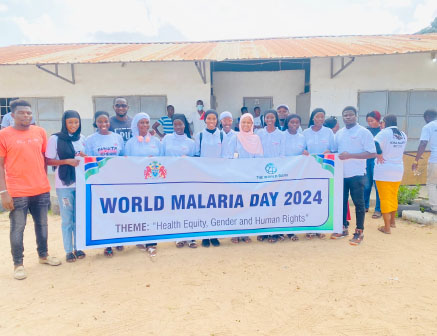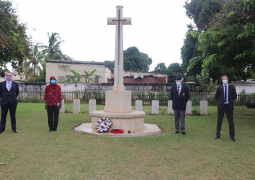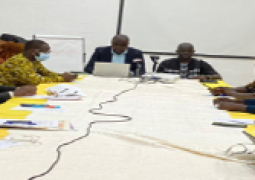
The commemorations earlier took the form of a march by youth organizations and women led by the Scout band from Bakoteh Junction Bar to the venue, Sukuta Primary School.
World Malaria Day is observed globally on 25th April annually to reflect on the gains made to set target goals aimed at eliminating malaria and for governments to renew their political and economic commitments towards malaria prevention and control. Thus, the theme for this year’s event being ‘health, equity, gender and human rights’, calls for the need for concerted efforts through partnership and effective communication networks between partners for improved health and wellbeing of the populace.
Welcoming the gathering, Momodou Bojang, Chief of Sanimentareng Ward, while underscoring the importance of the event, encouraged all to sleep under insecticide treated bed nets for their own safety.
He equally called on people to always adhere to the advice of health officials, adding that malaria is a killer disease.
For his part, Musa Camara, Regional Health Director, Western One Health Region, revealed annual the day is commemorated on April 25th, and this was observed nationally. However, in the strategy of not leaving anyone behind in the fight against malaria, they targeted reaching out to the larger community for an interface to end malaria through individual and collective efforts.
Making malaria services available and accessible to communities at an affordable cost is critically important and in line with the Universal Health Coverage strategy. This will help reduce the burden of malaria morbidities and mortalities on individuals, heads of families, communities and the country.
Camara reminded that in 2023, the World Health Organization (WHO) reported 247 million cases with 619,000 deaths as opposed to 245 million cases in 2020 with 625,000 deaths.
He noted that the entire population of the Gambia is at risk of malaria and transmission is intense for most of the year, adding that the annual reported number of malaria cases in 2021 was 77,287 with 42 deaths.
Balla Gibba, programme manager, National Malaria Control Programme (NMCP), explained that the commemoration of the day provides them with an opportunity to assess progress made towards malaria control and prevention at global and national levels, as well as accelerate efforts towards malaria control and elimination through renewed political commitments, investments and partnerships.
The Ministry, he added, continues to make available interventions and services for malaria control and prevention to achieve elimination in The Gambia.
These include provision of insecticide treated bed nets for the general populace, especially pregnant women and children under five, test kits and antimalaria medicines for appropriate diagnosis and effective treatment of malaria illness. Seasonal Malaria Chemoprevention for young children services for the prevention of malaria during pregnancy.
Ousman Bojang, governor of West Coast Region, highlighted the need for to take a moment and reflect on some of the gains made by government with support from partners on malaria prevention, control and elimination interventions.
WHO Malaria Day, as WHO stated, requires us o highlight the need for continued investment and sustained political commitment for malaria prevention and control.
Governor Bojang observed that malaria transmission in the Gambia is perennial, with variations that are highly seasonal.
Professor Umberto D'Alessandro, united director MRC Unit, The Gambia, while expressing delight to be associated with the event, acknowledged with appreciation the work of the NMCP.
He acknowledged the threat pose by malaria, further dwelling on the four-variant type of mosquitos in the country and how each of this type affect the health of people.
Prof. D'Alessandro used the event to talked about close collaboration between the scientific community and research unit to help eradicate the disease.
Momodou Gassama, health specialist at WHO country office, gave harrowing statistics on malaria fatalities in the world, with Africa accounting for significant chunk of all malaria related deaths.
Gassama also reminded that what is even worrying is that malaria is having a devastating impact on the vulnerable group and children.
He disclosed that 80 percent of all malaria deaths are among children under five, pointing out the need for all to sleep mosquito treated insecticide bed nets.
In view of his devastating nature, Gassama outlined the need for multi-sectoral approach and strengthening of community dialogue to help reduce malaria incidences in the country.
Read Other Articles In National News




